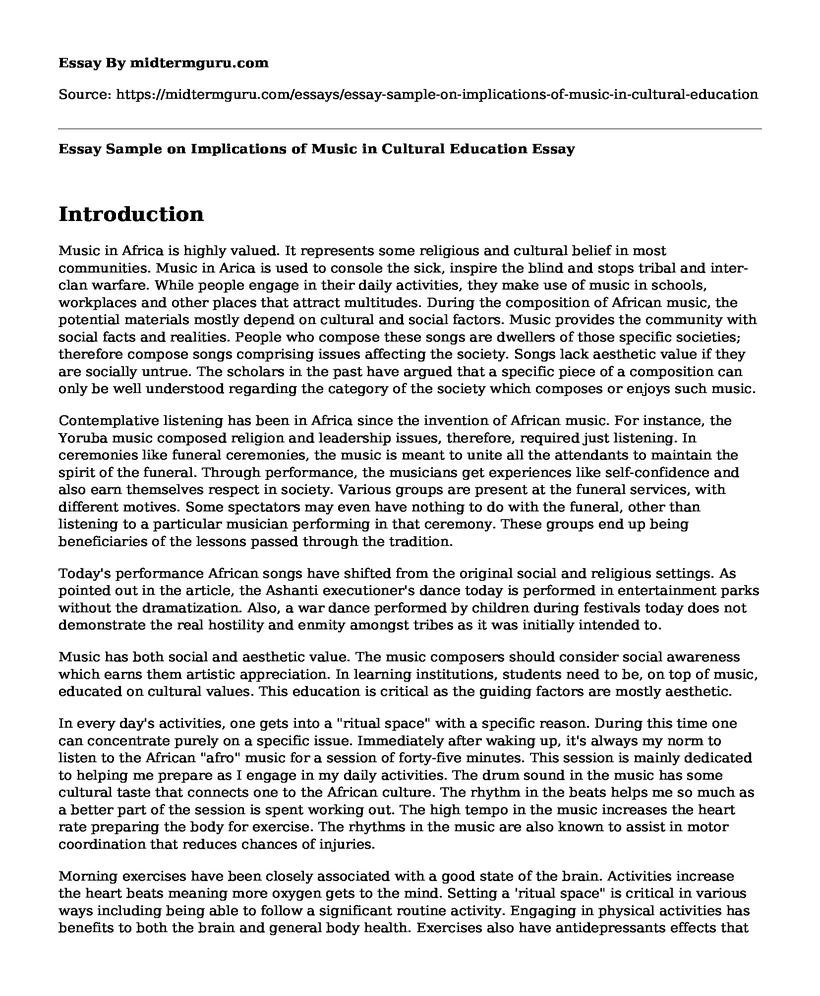Introduction
Music in Africa is highly valued. It represents some religious and cultural belief in most communities. Music in Arica is used to console the sick, inspire the blind and stops tribal and inter-clan warfare. While people engage in their daily activities, they make use of music in schools, workplaces and other places that attract multitudes. During the composition of African music, the potential materials mostly depend on cultural and social factors. Music provides the community with social facts and realities. People who compose these songs are dwellers of those specific societies; therefore compose songs comprising issues affecting the society. Songs lack aesthetic value if they are socially untrue. The scholars in the past have argued that a specific piece of a composition can only be well understood regarding the category of the society which composes or enjoys such music.
Contemplative listening has been in Africa since the invention of African music. For instance, the Yoruba music composed religion and leadership issues, therefore, required just listening. In ceremonies like funeral ceremonies, the music is meant to unite all the attendants to maintain the spirit of the funeral. Through performance, the musicians get experiences like self-confidence and also earn themselves respect in society. Various groups are present at the funeral services, with different motives. Some spectators may even have nothing to do with the funeral, other than listening to a particular musician performing in that ceremony. These groups end up being beneficiaries of the lessons passed through the tradition.
Today's performance African songs have shifted from the original social and religious settings. As pointed out in the article, the Ashanti executioner's dance today is performed in entertainment parks without the dramatization. Also, a war dance performed by children during festivals today does not demonstrate the real hostility and enmity amongst tribes as it was initially intended to.
Music has both social and aesthetic value. The music composers should consider social awareness which earns them artistic appreciation. In learning institutions, students need to be, on top of music, educated on cultural values. This education is critical as the guiding factors are mostly aesthetic.
In every day's activities, one gets into a "ritual space" with a specific reason. During this time one can concentrate purely on a specific issue. Immediately after waking up, it's always my norm to listen to the African "afro" music for a session of forty-five minutes. This session is mainly dedicated to helping me prepare as I engage in my daily activities. The drum sound in the music has some cultural taste that connects one to the African culture. The rhythm in the beats helps me so much as a better part of the session is spent working out. The high tempo in the music increases the heart rate preparing the body for exercise. The rhythms in the music are also known to assist in motor coordination that reduces chances of injuries.
Morning exercises have been closely associated with a good state of the brain. Activities increase the heart beats meaning more oxygen gets to the mind. Setting a 'ritual space" is critical in various ways including being able to follow a significant routine activity. Engaging in physical activities has benefits to both the brain and general body health. Exercises also have antidepressants effects that are believed to lower the stress hormone.
References
Flolu, E. J. (1996). Music in traditional Africa cultures: Beneath and beyond the utilitarian factor. The African Music Educator, 8, 8-13.
Cite this page
Essay Sample on Implications of Music in Cultural Education. (2022, Nov 06). Retrieved from https://midtermguru.com/essays/essay-sample-on-implications-of-music-in-cultural-education
If you are the original author of this essay and no longer wish to have it published on the midtermguru.com website, please click below to request its removal:
- Essay Sample on Patty Plaintiff's Really Bad Week
- Film Analysis Essay on The Matrix: Real and Reality
- Paper Example on Media's Positive Effect on the LGBTQ Community
- Movie Analysis Essay on Real Women Have Curves
- Music: A Journey From Africa to Humanity's Soul - Essay Sample
- High School vs College: Comparing Education Levels - Essay Sample
- Daycare Center Impacts Children's Development: Observations - Research Paper







